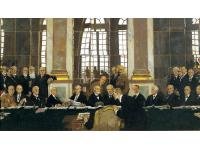The Origins of World War II
World War II, a cataclysmic global conflict that reshaped the world, began not with a single event, but with a complex interplay of political, economic, and social factors. The roots of this devastating war can be traced back to the unresolved issues of World War I and the Treaty of Versailles. The Treaty, signed in 1919, imposed harsh penalties and reparations on Germany, which fostered a deep sense of humiliation and economic distress among its people. This environment of resentment and suffering created fertile ground for extremist ideologies and leaders, most notably Adolf Hitler and the Nazi Party, who promised to restore Germany's former glory.

The Rise of Totalitarian Regimes
The interwar period saw the rise of totalitarian regimes not only in Germany but also in Italy and Japan. In Italy, Benito Mussolini established a fascist state, promoting aggressive nationalism and militarism. Japan, meanwhile, embarked on a campaign of imperial expansion in East Asia, driven by the need for natural resources and the desire to be a dominant power. These nations, driven by a mix of ideological fervor and strategic ambitions, began to pursue aggressive foreign policies that would eventually lead to conflict.
The Failure of the League of Nations
The League of Nations, established after World War I to promote peace and cooperation, proved ineffective in curbing the aggressive actions of these totalitarian states. The League's inability to enforce its resolutions or provide a credible deterrent against aggression was evident in several key incidents. For instance, when Japan invaded Manchuria in 1931 and Italy invaded Ethiopia in 1935, the League's responses were weak and ineffective, emboldening the aggressors. This failure highlighted the impotence of international institutions in maintaining peace, contributing to the climate of instability.
The Policy of Appeasement
In the 1930s, European powers, particularly Britain and France, adopted a policy of appeasement towards Germany. This approach was characterized by concessions to Hitler in hopes of avoiding war. The Munich Agreement of 1938, where Britain and France allowed Germany to annex the Sudetenland from Czechoslovakia, is the most infamous example. While appeasement was initially seen as a pragmatic solution to prevent another devastating war, it ultimately emboldened Hitler, who perceived it as a sign of weakness and a green light to further his expansionist agenda.
The Nazi-Soviet Pact
One of the pivotal moments leading up to World War II was the signing of the Nazi-Soviet Pact in August 1939. This non-aggression treaty between Germany and the Soviet Union shocked the world, given their ideological differences. The pact included secret protocols dividing Eastern Europe into spheres of influence, which provided Hitler with the assurance that he could invade Poland without fear of Soviet intervention. This agreement not only sealed Poland's fate but also set the stage for the broader conflict, as it removed the immediate threat of a two-front war for Germany.
The Invasion of Poland
The final spark that ignited World War II was Germany's invasion of Poland on September 1, 1939. This blatant act of aggression prompted Britain and France to declare war on Germany, fulfilling their obligations to Poland. The swift and brutal nature of the invasion, characterized by the use of blitzkrieg tactics, demonstrated the destructive potential of modern warfare. Within weeks, Poland was overwhelmed, and the war that would engulf the globe had begun.
Conclusion
World War II's origins are deeply rooted in the aftermath of World War I, the rise of totalitarian regimes, the failure of international diplomacy, and the aggressive expansionist policies of the Axis powers. The cumulative effect of these factors created a volatile environment that made global conflict almost inevitable. Understanding these causes not only sheds light on one of the darkest periods in human history but also provides crucial lessons for preventing future wars.







